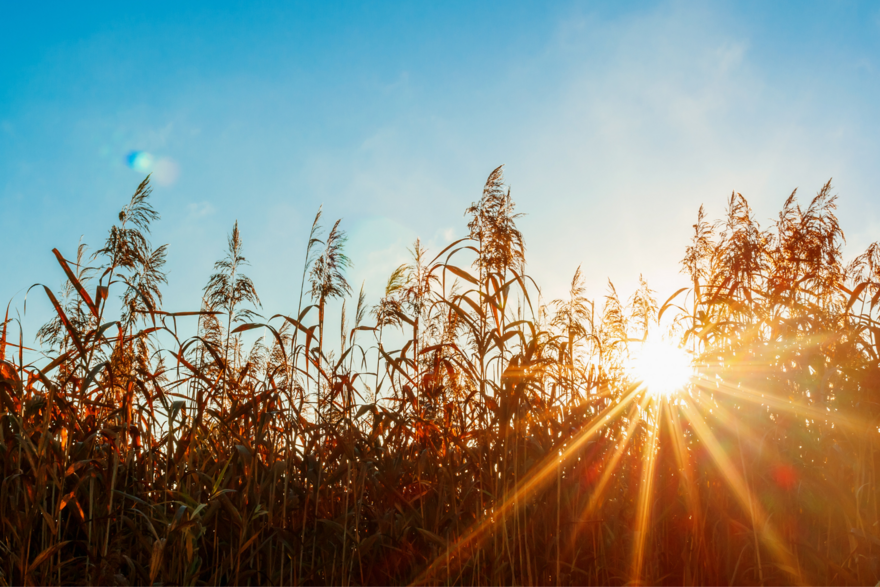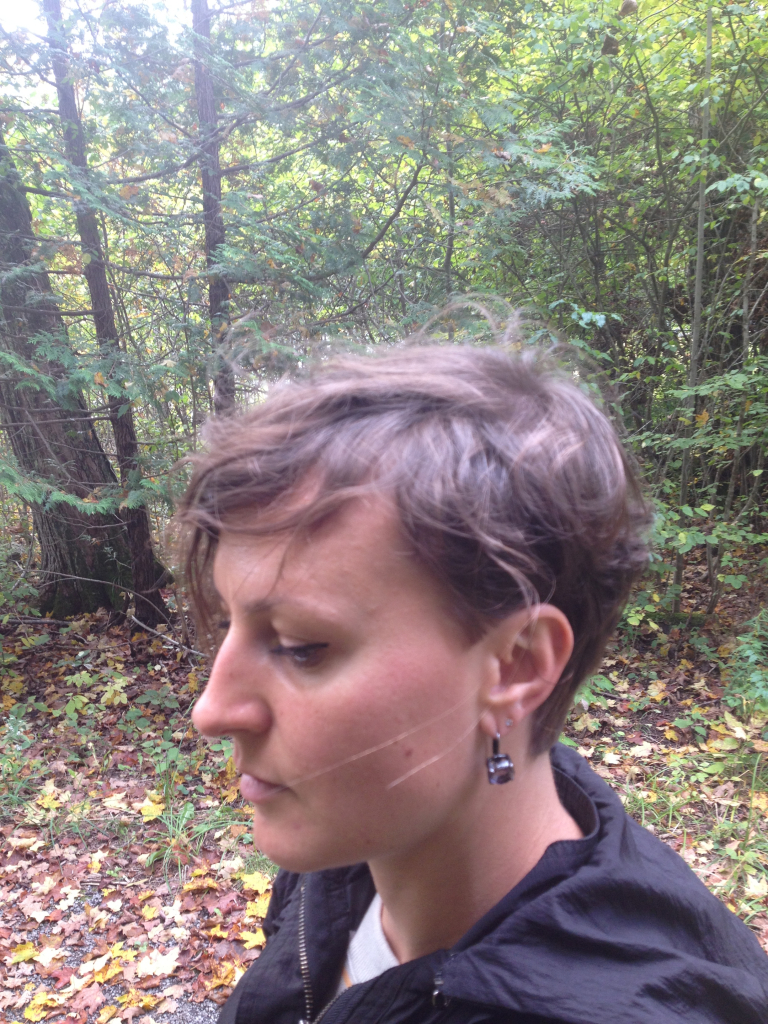In the Spotlight: Seyward Goodhand

I met Seyward through her writing, before I even knew her name, when I was one of the judges for The Journey Prize a few years ago. (Her story was brilliant and weird, and I loved it fiercely – you can find it in the anthology, here.) I’m pleased to say that she is now a TA for The Story Intensive. Lucky us!
Seyward’s writing can be high-concept, technically astute, and crafted with attention to literary tradition, so the tone is at once antique and modern. In her excerpt below, her sentences are savoury, compelling, sculptural — and totally enchanting. Her dairymaid is lost in a crazy reverie as she churns cream in the pasture, and Seyward spikes her story with emotional observations so sharp they can make you gasp. Take this dizzying description: “The smell of beaten cream is sweet with an undercurrent of womb.”
I adore the way she writes with her head and her heart, blending the technical with the emotive. When I read her work I think, “Wait — you can do that?”
Meet Seyward
 Seyward Goodhand’s stories have appeared in PRISM International, Grain, echolocation, Riddle Fence, Dragnet Magazine and Journey Prize Stories 23. In 2011 she was a finalist for the Journey Prize. She is a PhD Candidate in English Literature at the University of Toronto.
Seyward Goodhand’s stories have appeared in PRISM International, Grain, echolocation, Riddle Fence, Dragnet Magazine and Journey Prize Stories 23. In 2011 she was a finalist for the Journey Prize. She is a PhD Candidate in English Literature at the University of Toronto.
Handwriting or computer?
Handwriting, then computer.
Page count or time count?
Time count.
First drafts or revision?
First drafts.
Writing solo, writing partner, or writing group?
Solo, then a group.
Earplugs/quiet or headphones/music?
Quiet.
Why do I write?
I guess I started writing because I read. Even now I begin a session by reading a story. That’s how I know it’s possible. So I write because I feel compelled to join in, but there are more complicated reasons as well, some generous, others egotistical. I am not a materialist and poetic language animates dead matter by the way it uses verbs. (An example from Anne Carson: “July moonshadows stood motionless on the grass.”) That anguished state of clarified wonder is addictive. I’m bitter and depressed if I don’t write. It’s how I understand and honour certain experiences. I want to give someone the feeling of being carried away and cast in a spell. I want to write something good. A lot of I wants. Still, careful, crafty acts help us to love the world—fiercely, with joy and sorrow—by, as Flannery O’Connor says, “plunging us into reality.” Writing fits in here with planting, building, making music, tending to the sick. All in the end futile (drought, fire, uselessness, death), but awesome acts of faith. And there’s some ecstasy in it too, as with singing, or, if you’re a plant, flowering in the direction of the sun.
Who are you reading for influence and why?
Alice Munro, Lorrie Moore and Deborah Eisenberg for many reasons. 1.) For their articulation of complex mental states during intimate encounters, in other words, for their wisdom, 2.) for their understanding of the social, 3.) Munro for representing entire, full decades succinctly, and 4.) for the sophisticated and nearly invisible way she navigates time.
George Saunders for voice and sentiment.
Angela Carter for 1.) her sentences, 2.) making you feel like you’re in a dream, 3.) being at once conceptual and concrete.
Italo Calvino, Karen Russell and Steven Millhauser for magic, warmth and sentences.
Denis Johnson for 1.) making you feel like you’re in a nightmare, 2.) structure, 3.) the surprising softness in the hardness.
Tell us about the excerpt you're sharing today.
This story is about an affair and a break-up. It’s written as a pastoral from three alternating perspectives. Here’s a sample of the dairymaid’s.
Excerpt from "Dairymaid, Shepherd, Monk", by Seyward Goodhand
Heels deep, thighs strained, palms burning, belly tense as a flexed tongue: the dairymaid churns cream on the grassy rise in the centre of the pasture. Her attention is split between learning the Psalm the monk has tasked her to know by the end of the day, and revelling in the admiration of men. Old men rinsing dye from wool, young men carrying planks of wood down the path to the stable and stopping to rest on the fence, lame men on stumps plucking feathers out of geese their wives have killed. Boys skipping down the mossy lane with their fathers’ lunches, crusts of bread and pressed cottage cheese as sectile as butter, wrapped in cloth.
She remembers the monk’s quiet intensity when he said, “This is the most beloved of Psalms.” He is so young—four months younger than her! But he has a voice one believes. The LORD is my shepherd, I shall not want.
She lifts her arms higher, for she will make merry with the sweat staining the blue cotton bodice under her breasts and soaking her frilled, white sleeves. The stone her own shepherd gave her, which he chipped from the base of the mountain’s peak and fastened to a woollen string to go around her neck, is between the dairymaid’s teeth so it doesn’t swing into her pole and crack. She imagines him bracing his sweet, round face against the wind, scanning the dark volcanic crags brushed in snow until he sees this piece, the one that glints. Oh good God.
He makes me lie down in green pastures; he leads me beside still waters.
No, you don’t understand, these verses are for me, she told the monk yesterday.
He tilted his beautiful face and shyly beheld her. “For us all,” he said.
Her shoulders burn with a glorious power as she plunges again and again into her barrel. The smell of beaten cream is sweet with an undercurrent of womb. It will be so light and delicious when chilled. But warm milk makes the dairymaid sick unless she gives herself over to it entirely, glories in the hot squelch, the still, golden air, the black tendrils curled around her throat, her clenched bowels, her saltiness. Her body produces miraculous fluids with which she would paint the countryside if it weren’t already so vibrantly green and yellow. Far off, out of a copse of tall, swaying maple, an exaltation of larks! Nature loves her. She imagines charming snakes out of the sand and commanding spiders to swarm her enemies. Only she is privy to their horrible ecstasy because she comes to all the loathed things with joy, as a playmate.
My cup overflows…
Almost by mistake, she looks up. There they are. Just beyond the ring of awed men, the other dairymaids are clustered together in a cool corner of someone’s porch. They have draped a sheet over their barrels of cream to keep the flies away while they twist each other’s long, auburn hair. Pink and periwinkle ribbons flutter in a basket the dairymaid stares at so the women won’t think she’s staring at them. The ribbons will be braided into all the hair so everybody knows the heads match. She is the only one not invited.
Note: These monthly spotlights showcase Mysterious Middle Drafts (MMDs). That means they are somewhere between first drafts and final drafts. This is a challenging stage! Emerging writers bravely share their work-in-progress here for discussion, but this is not a book review or critique: this is a venue for the appreciation of Mysterious Middle Drafts. Thank you for making this writing space safe and supportive.
Discussion:
-
What remains with you after reading Seyward's work?
-
Can you articulate what’s working in this excerpt — and more importantly, why it’s working?
-
How is your own writing practice like Seyward's? How is it different?
Please leave a comment below. And thank you, Seyward!

2 comments
Leave a comment